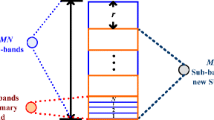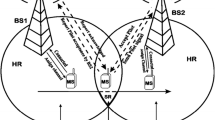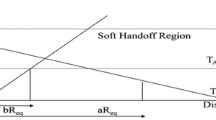Abstract
In this paper, we have studied the impact of the handoff dwell time (HDT) on the channel holding time (CHT) modeling and examined how it affects the mobile network performance evaluation. Realistic mobility model is constructed that includes the effect of HDT and we derive the important relationship between the critical parameters such as cell residence time (CRT), call holding time, CHT and HDT. Queueing priority scheme utilizing the HDT is applied to evaluate the HDT effect on performance indices in terms of the new call and handoff call blocking probabilities. It is observed that the relative error between the realistic new call blocking probability and conventional one can reach 70% and the conventional handoff blocking probability can even double the realistic one under the same specific practical condition. Next, we compare the new call and handoff call blocking probabilities when exponential handoff dwell time distribution is replaced by truncated Gaussian distribution with both the same mean and standard deviation in the discrete event simulation. A considerable gap between the handoff call blocking probabilities is shown, which indicates that the performance indices are sensitive to the handoff dwell time distribution.
Similar content being viewed by others
References
D. Hong and S.S. Rappaport, “Traffic Model and Performance Analysis for Cellular Mobile Radio Telephone Systems with Prioritized and Nonprioritized Handoff Procedure”, IEEE Trans. Vehicle Technol., Vol. 35, No. 3, pp. 77–92, 1986.
Y. Fang and I. Chlamtac, “Teletraffic Analysis and Mobility Modeling of PCS Networks”, IEEE Trans. Vehicle Technol., Vol. 47, No. 7, 1999.
M. Ruggieri, F. Graziosi and F. Santucci, “Modeling of the Handover Dwell Time in Cellular Mobile Communications Systems”, IEEE Trans. Vehicle Technol. Vol. 47, No. 2, 1998.
Y.-B. Lin, et al., “Queuing Priority Channel Assignment Strategies for PCS Hand-Off and Initial Access”, IEEE Trans. Commun., Vol. 43, No. 3, pp. 704–712, 1994.
C.-J. Chang, et al., “Analysis of a Cutoff Priority Cellular Radio System with Finite Queuing and Reneging/Dropping”, IEEE Trans. Networking, Vol. 2, No. 2, pp. 166–175, 1994.
W. Li and A.S. Alfa, “Channel Reservation for Handoff Calls in a PCS Network”, IEEE Trans. Vehicle Technol., Vol. 49, No. 1, 2000.
Y. Fang, I. Chlamtac and Y.-B. Lin, “Call Performance for a PCS Network”, IEEE Journal of Sel. Areas in Communications, Vol. 15, No. 8, 1997.
Y. Fang, I. Chlamtac and Y.-B. Lin, “Modeling PCS Networks under General Call Holding Time and Cell Residence Time Distributions”, IEEE Trans. Vehicle Technology, Vol. 5, No. 6, 1997.
D. Gross and G. Harris, “Fundamental of Queueing Theory”, Wiley, New York, 1985.
M.M.Zonoozi and P. Dassanayake, “User Mobility Modeling and Characterization of Mobility Patterns”, IEEE Journal of Sel. Areas in Communications, Vol. 15, No. 7, 1997.
C. Chang, et al., “Analysis of a Hierarchical Cellular System with Reneging and Dropping for Waiting New and Handoff Call”, IEEE Trans. Vehicle Technology, Vol. 48, No. 4, 1999.
Q.-A. Zeng, K. Mukumoto and A. Fukuda, “Performance Analysis of Mobile Cellular Radio System with Priority Reservation Handoff Procedures”, IEEE VTC, 1994.
A. Xhafa and O.K. Tonguz, “Dynamic Priority Queuing, Channel Borrowing, and First in First Out Handoff Schemes: A Performance Comparison”, IEEE VTC, Vol. 2, 2001.
A. Xhafa and O.K. Tonguz, “A New Queuing Scheme for Handoffs in 3G Wireless Networks”, IEEE VTC, Vol. 2, 2001.
M. Ruggieri, F. Graziosi and F. Santucci, “A Model of the Handover Dwell Time in Mobile Cellular Systems”, Proceedings of the IEEE ICUPC’95, 1995.
M. Ruggieri, F. Graziosi and F. Santucci, “Characterization of the Handover Dwell Time in Mobile Cellular Networks”, Proceedings of the IEEE GLOECOM’95, 1995.
Y. Fang and Y. Zhang, “Call Admission Control Schemes and Performance Analysis in Wireless Mobile Networks”, IEEE Trans. Vehicle Technology, Vol. 51, No. 2, pp. 371–382, 2002.
Author information
Authors and Affiliations
Corresponding author
Additional information
Zhang Yan received the B.S. degree in communication engineering from the Nanjing University of Post and Telecommunication, People’s Republic of China, in 1997 and the M.S. degree in electrical engineering from the Beijing University of Aeronautics and Astronautics in 2000. After graduation, he worked as senior software engineer in Xinwei Telecom Technology Co., Datang Telecom Group, China, where he has been working on the CDMA base station software development. He is currently pursuing Ph.D. degree in School of Electrical and Electronics Engineering, Nanyang Technological University, Singapore. His research interests include call admission control and resource management in wireless multimedia systems, PCS network traffic load and performance evaluation.
Dr. Soong Boon-Hee received his B. Eng. (Hons. I) degree in electrical and electronic engineering from University of Auckland, New Zealand, and the Ph.D. degree from the University of Newcastle, Australia, in 1984 and 1990, respectively. He is currently an associate professor with the School of Electrical and Electronic Engineering, Nanyang Technological University. From October 1999 to April 2000, he was a visiting research fellow at the Department of Electrical and Electronic Engineering, Imperial College, UK, under the Commonwealth Fellowship Award. He also served as a consultant for Mobile IP in a recent technical field trial of Next-Generation Wireless LAN initiated by InfoComm Development Authority (IDA), Singapore. He has supervised a number of postgraduate students in the area of optimization and planning of mobile communication networks. He has been teaching a number of subjects related to the field of network performance. His area of research interests includes ad-hoc networks, mobility issues, mobile IP, optimization of wireless networks, routing algorithms, queueing theory system theory, quality of service issues in high-speed networks, and signal processing. He has published a total of 60 international journals and conferences. He is a member of IEEE.
Rights and permissions
About this article
Cite this article
Zhang, Y., Soong, BH. The Effect of Handoff Dwell Time on the Mobile Network Performance. Wireless Pers Commun 31, 221–234 (2004). https://doi.org/10.1007/s11277-004-3951-2
Issue Date:
DOI: https://doi.org/10.1007/s11277-004-3951-2




